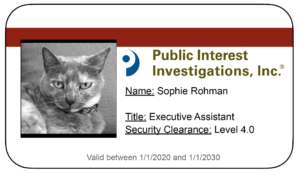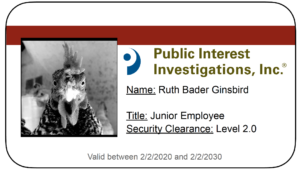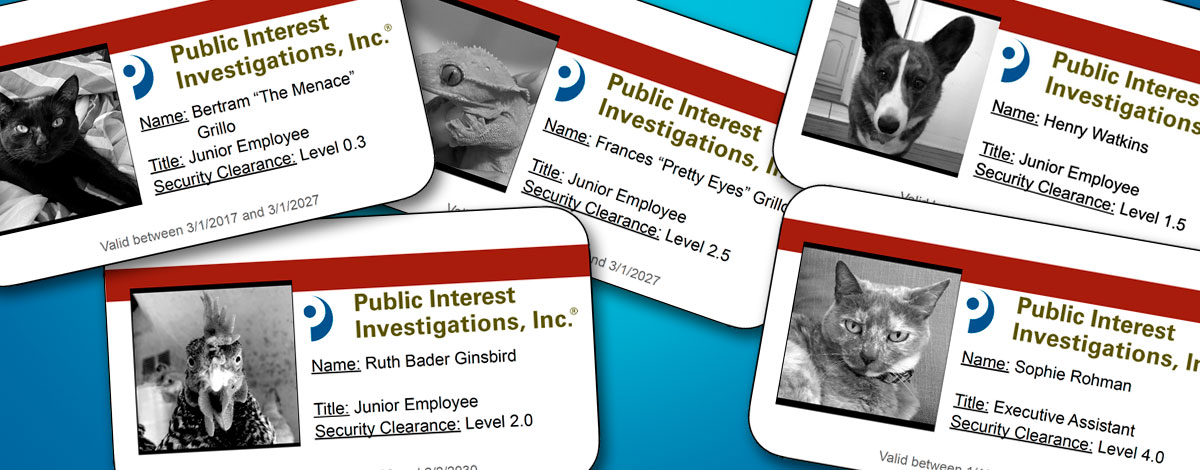By Keith Rohman
There is a risk we have not been talking about in the field of workplace investigations.
With the recent stay-at-home orders, we have all become “in-house” investigators. And who is there with us, day in and day out: listening to our interviews, looking over our desks at confidential documents, participating in Zoom calls with colleagues?
 It is our pets: dogs, cats, reptiles, even chickens. Sure, they may look uninterested in our conversations, but are they really? How do we know? And can they be fully trusted to keep our client’s most sensitive secrets? Who do they talk to? Who do they socialize with? Do they have social media accounts? Honestly, I love my cat, Sophie, but do I trust her with information about allegations of high-level corruption among elected officials in a nearby city? I am not sure.
It is our pets: dogs, cats, reptiles, even chickens. Sure, they may look uninterested in our conversations, but are they really? How do we know? And can they be fully trusted to keep our client’s most sensitive secrets? Who do they talk to? Who do they socialize with? Do they have social media accounts? Honestly, I love my cat, Sophie, but do I trust her with information about allegations of high-level corruption among elected officials in a nearby city? I am not sure.
It is for this reason that my firm, Public Interest Investigations, Inc. (PII), has instituted a Pet Confidentiality Policy. Of course, all human employees sign confidentiality agreements when hired, but until recently, that did not cover the animals living in their homes.
Now all employees must complete a short survey providing a census of the non-human residents of their homes and answering certain important questions:
- Do your pets have access to confidential information by listening to confidential interviews or conversations? Can they view any confidential documents?
- Is there an option for restricting your pets’ access to this information, for example, by locking them out of interview areas? Or do they sit outside your office doors, barking, whining, or mewing until let in?
- How much contact do your pets have with outsiders? Reporters? Other investigators? Other pets?
- How good are your pets’ communication skills? Do they have their own social media accounts, and if so, do you monitor that activity?
- How smart are your pets? Can they operate an electronic device? Do they have access to other communication devices?
In the process, we have learned some concerning information. Some pets appear to wander in and out of interviews at will. Others—mostly cats—are allowed to hop up on desks and look over detailed investigation reports as well as employee personnel files. In some cases, HIPAA-protected information is left out where any animal can view it. One family cat is regularly the subject of an Instagram account. Another is often seen on the Facebook feed of an otherwise trusted and discrete investigator.
 In some cases, we have been reassured by what we found. One investigator has several chickens, including Whoopi Goldbird and Ruth Bader Ginsbird, but both chickens are busy outside laying eggs and do not come into the house. One family dog, Rosita, is a primarily monolingual Spanish-speaker which works as long as the interviews are conducted in English.
In some cases, we have been reassured by what we found. One investigator has several chickens, including Whoopi Goldbird and Ruth Bader Ginsbird, but both chickens are busy outside laying eggs and do not come into the house. One family dog, Rosita, is a primarily monolingual Spanish-speaker which works as long as the interviews are conducted in English.
In any event, all PII Pets are now required to read or have read to them our Pet Confidentiality Policy and to affix their paws or other type of print to the document. They are then issued security cards listing their level of clearance.
No system is foolproof. But with the prospect of “in-house” investigations continuing at least through most of the year, workplace investigators need to assure that our work continues to be maintained with the highest degree of confidentiality.
This article first appeared in AWI Journal, Vol. 11, No. 3. Reprinted with permission.


